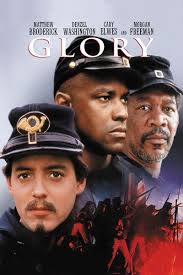Tidbits: Glory
In preparation for the TCM Big Screen Classics 30th Anniversary screening of Glory, here are some historical tidbits about the film, courtesy of IMDB.

Several of the extracts from Colonel Shaw’s supposed letters to his mother, as heard in voice-over narration throughout the film, were actually taken from “Army Life in a Black Regiment,” an 1870 book by Thomas Wentworth Higginson, who commanded the 1st South Carolina Regiment during the Civil War. The book is available here.
Very early in the movie, there is a scene of Union soldiers playing baseball. While there remains considerable dispute about exactly when, where and how the sport was invented, there is no question that the Civil War itself had a significant role in the rapid growth of the sport, as it became a popular pastime for soldiers on both sides of the Mason-Dixon line, who spread it around the country. In fact, Union General Abner Doubleday once was credited with inventing baseball, but that theory has long since been discredited. Baseball dates back to the 1840s; check out Baseball: A Film by Ken Burns for more on its beginnings.
The film depicts the 54th Massachusetts Volunteer Infantry training through the Christmas holidays of presumably 1862 (after the September 1862 Battle of Antietam), but the real 54th Massachusetts did not organize until March 1863, and were engaged in their first battle on James Island, South Carolina on July 16, 1863, and then Battery Wagner (the final battle in the film) on July 18, 1863. More on the history of 54th Massachusetts Volunteer Infantry can be found in these two books: “Fighting for Glory: The History and Legacy of the 54th Massachusetts Volunteer Infantry Regiment” and “Tell It With Pride: The 54th Massachusetts Regiment and Augustus Saint-Gaudens’ Shaw Memorial”.
